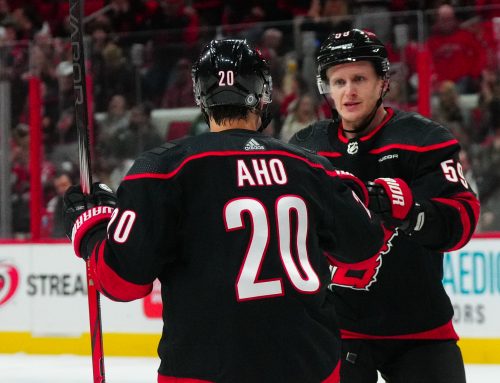Top 10 Tips For a New Fantasy Commish
Tom Collins
2021-08-16
So you want to be a fantasy hockey commissioner. Congratulations, but keep in mind that it is often a thankless, demanding volunteer position.
But every great fantasy league needs a great leader. Without one, most leagues will falter, especially when a controversial topic rears its head.
Maybe you find yourself in the commissioner position because you want to start your own league. Perhaps the other GMs trust you and voted you to be commish. Possibly, you're replacing a commish who left for personal reasons.
It can be a difficult road. Here are 10 tips to keep in mind for new commissioners.
10. Take an early position on vetoes
The decision to include vetoes and how to establish them are often the most controversial aspects of running a fantasy league. Keep in mind a veto should be experienced as often as a Phil Danault postseason goal: An extremely rare occurrence. If there are five vetoed trades a year, there is something wrong with the league. A bad trade shouldn't be vetoed, although some leagues believe horrific deals that unfairly shift the balance (or if a GM accepts a worse trade than someone else had offered) should be overturned. Many believe vetoes should only be if there was collusion. There are a few different ways to go about handling a veto system. Some leagues leave all the power to the commish. Others have a group of three or five members who vote on trades, while some have an overall vote from all the GMs.
9. Close loopholes
One thing some fantasy general managers enjoy is trying to find ways to give their team an advantage. As a commish, you need to be aware and close those loopholes quickly. For example, in one of my keeper leagues, we used to allow conditions on trade. One season, a GM who was in contention for the championship traded a second-round pick for Franzen, with the condition the pick become a first rounder if Franzen finished in the GM’s top eight forwards for points. Some time later when Franzen was injured, I figured I could trade a pick for Franzen and a prospect. That way, with Franzen on my team, the other GM would have his first-round pick available again for trade. These loopholes were eventually closed by the commish.
8. Decide if you want unique rules
Something that throws a unique wrinkle into a league can be a lot of fun. One of my leagues has a novel way to deal with our draft. All the dropped players are entered into an auction, and an owner can bid their draft picks on dropped players. The highest bid gets the player, but the owner who dropped the player gets the winning draft pick. It adds strategy to drops and bidding. Are you willing to give your top competition a second-round pick in an auction? Rules like this also provide more value to later-round picks since they are often used for dropped players.
7. Decide on a draft lottery system in advance
Teams near the bottom of the standings are always going to want to tank. How do you best decide on who gets the first-overall pick? This is something your league mates need to know before the season even begins. You can simply award the first overall pick to the GM who finishes last. You can mimic the NHL draft lottery by aligning a fantasy squad to an NHL lottery team. One of my leagues used poker chips instead of lottery balls, and not only did the draw in the presence of at least two other owners, would video the results and send it to the rest of the league. You can also assign odds to each team and use Dobber's Lottery Draft Generator, which automatically conducts a draft lottery and emails the results to the league.
6. Stay consistent with rulings
If you're in a league with friends, one of the suckiest things is when you have to rule against your best buddy. Sure, it may be tempting to give him some leeway, but if a penalty for abusing the waiver is a loss of a draft pick, you have to take away your friend’s pick. Because next season, it may happen to a GM you don't know as well. It’s unfair if you take away that GM's draft pick after giving your buddy some freedom, and you'll quickly lose the trust of the other GMs.
5. No changing rules during the season
Once the draft is done, you're pretty much stuck with the system you have in place, and it would be unfair to change it. If you create a 15-team league that starts three goalies, there will be slim pickings on the waiver wire and some GMs will complain. That’s all you can do. It would be unfair to change the rules so only two netminders count, as some GMs may have drafted with the idea of having three number one goalies. Plus, as soon as you change the rule, you devalue the position.
4. Make sure everyone is active
Being active is more than ensuring a fantasy GM sets their lineups daily or weekly. Fantasy GMs have an obligation to respond to trade requests and work to make their team better. There is some leeway (vacation, busy time at work, personal stuff at home), but someone who never responds to trade offers makes the league less enjoyable for everyone. Even a quick "sorry-I-don't-plan-on-trading-that-player-since-he-plays-on-my-favorite-team" reply is enough of a response.
3. Don't cheat
This should almost go without saying, but being a commish gives you access to tools that no one has. Depending on the provider, you can reverse lineup decisions after the deadline. You can change the waiver wire rules mid-season to benefit you. You can take over another player's team. I was in a private Yahoo basketball league one year on Yahoo, and the commish's team was awful. A month into the season, he took over everyone's team, dropped everyone’s players, claimed the best ones for himself and kept it that way for the rest of the season to ensure his championship. Don't be that guy. Just remember the wise adage from Ben Parker: With great power comes great responsibility.
2. Get the money up front
I learned this lesson the hard way, but it was in the fantasy football realm. I was commish of a 12-team league, where the entry fee was $20. Everyone paid before the draft except for two. They didn't pay after the draft. Or after the first week of the season. Or after week 6. Or at all. At the end of the season, I was still trying to get them to pay so I could hand out the winnings to the victors. They never did, and after a couple of weeks, I had to pay the extra cash out of my pocket. I didn't renew the league the next season because I didn't want to deal with that garbage again. No matter how close you may be with someone, make sure they pay in advance and have rules in place so they can be replaced or their team locked if they haven't paid by a certain deadline.
1. Have fun
Many fantasy leagues are free. The majority are $50 or less. Even though rules need to be applied uniformly, the point of fantasy leagues is not to make money. Instead, it's to have fun. No one is getting rich winning hockey pools, and if a GM is making life tough on his league mates, then the commish needs to step in. The role of a commish is often a thankless one, but ensuring everyone has fun (and that includes you) will make the league last for years.





 NYI
NYI CAR
CAR T.B
T.B FLA
FLA TOR
TOR BOS
BOS VGK
VGK DAL
DAL EDM
EDM WSH
WSH L.A
L.A VAN
VAN WPG
WPG NYR
NYR NSH
NSH BUF
BUF
